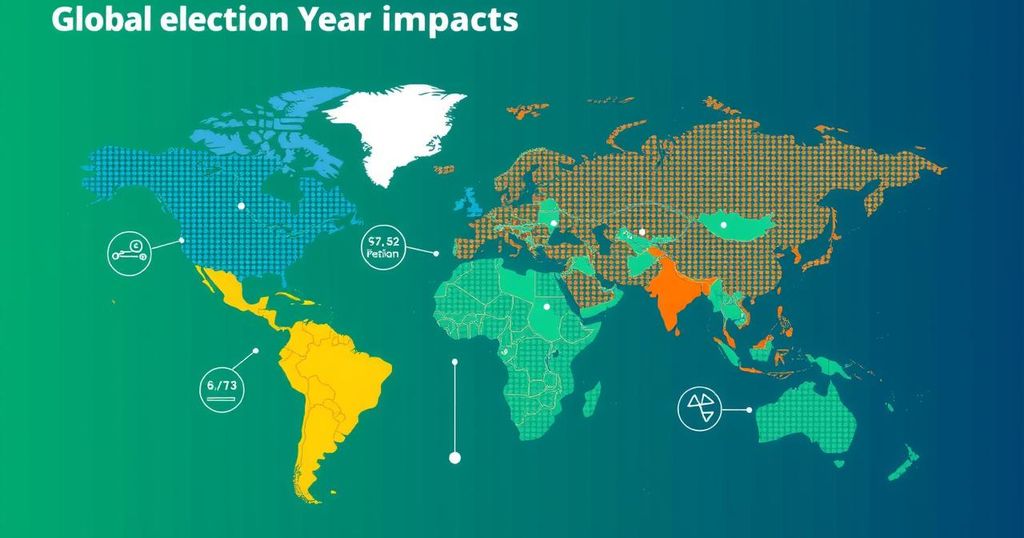Global Election Year Reveals Retreat from Climate Action Commitment

The year 2024 has unveiled a concerning trend of eroding commitment to climate action globally, with elections favoring leaders skeptical of climate change amidst escalating climate disasters. Despite some local victories for pro-climate policies, the overall retreat from prioritizing climate issues is alarming, as economic concerns increasingly overshadow the climate agenda. The recently concluded COP29 summit further illustrates the disparity between rhetoric and action, emphasizing the urgency for renewed focus on climate commitments.
The year 2024 has been marked as a pivotal election cycle around the globe, revealing a concerning trend – a diminishing commitment to tackling the climate crisis. Despite ongoing climate-related disasters and record-breaking temperatures, many nations are witnessing a retreat in climate activism and policy. Recent elections have favored leaders and parties with climate-skeptic ideologies, such as Donald Trump, who refers to climate concerns as a “big hoax,” and right-wing factions in Europe that denounce climate action as financially burdensome.
The gradual decline of climate urgency can be attributed to various global situations, including the pandemic’s impact, geopolitical conflicts, and economic uncertainties. Experts highlight that over the past five years, discussions surrounding climate action have shifted focus; priorities have skewed towards inflation and energy costs, minimizing climate’s significance. Catherine Fieschi, a political expert, remarked, “It’s been a bad year for climate and we’ve seen a gradual erosion in the public’s commitment to action.”
As 2024 proceeds, with expectations of it being the hottest year recorded, the climate issue remains overshadowed, except in areas like India, where farmers have protested against extreme weather impacts. Additionally, European elections have favored right-wing parties that reject costly climate policies. Despite some victories for pro-climate platforms, the prevailing trend suggests a waning urgency to address climate change head-on, alarmingly juxtaposed with the escalating frequency of extreme weather events.
In the backdrop of these political climates, the recent COP29 climate summit in Azerbaijan illustrated the lack of commitment and progress in climate negotiations. The event was notable for the absence of major world leaders, reflecting an emerging narrative that positions fossil fuel reliance as a divine blessing rather than a perilous liability. Activists like Gerry Arances criticized the insufficiency of climate funding from affluent nations, emphasizing the disconnect between verbal commitments and tangible actions.
The climate crisis has taken a backseat in political discourse, exacerbated by recent electoral outcomes favoring populist leaders. Edi Rama, Prime Minister of Albania, expressed frustration regarding the lack of accountability among major polluters, questioning the effectiveness of global climate gatherings. Even amidst advancements in renewable energy, persistent political delays threaten climate action effectiveness. Political scientists warn that complacency in addressing climate change could result in irreversible damage. The growing unease accentuates the urgency: “We are running out of precious time. Every day lost matters now.”
The article discusses the alarming trend of declining commitment to addressing the climate crisis amidst a significant electoral year in 2024. As global elections unfold, political leaders with a skeptical view of climate science are gaining traction, causing a setback in climate action efforts. Despite increasing climate disasters, public prioritization for climate initiatives is waning, overshadowed by economic concerns and geopolitical tensions. While notable victories for pro-climate candidates occurred in some regions, the overarching sentiment indicates a retreat from aggressive climate policies. The backdrop of the ongoing geopolitical landscape, compounded by crises such as the pandemic and wars, has contributed to a shift in public focus towards immediate economic issues like inflation and energy prices. This changing narrative impacts public engagement and governmental focus on climate action, revealing a troubling regression in the global climate agenda. The current discourse surrounding climate is increasingly interwoven with cultural and political battles, further complicating the path toward effective climate solutions.
In conclusion, the current election year of 2024 has highlighted a troubling regression in global commitments to combat climate change, exacerbated by notable electoral victories for climate-skeptic leaders. The prioritization of immediate economic concerns over climate action has led to a significant shift in public engagement with the climate crisis, despite the urgency underscored by ongoing environmental disasters. COP29’s outcomes reflect the disconnect between global commitments and real action, emphasizing the critical need for renewed focus and accountability in addressing the climate emergency.
Original Source: www.theguardian.com






